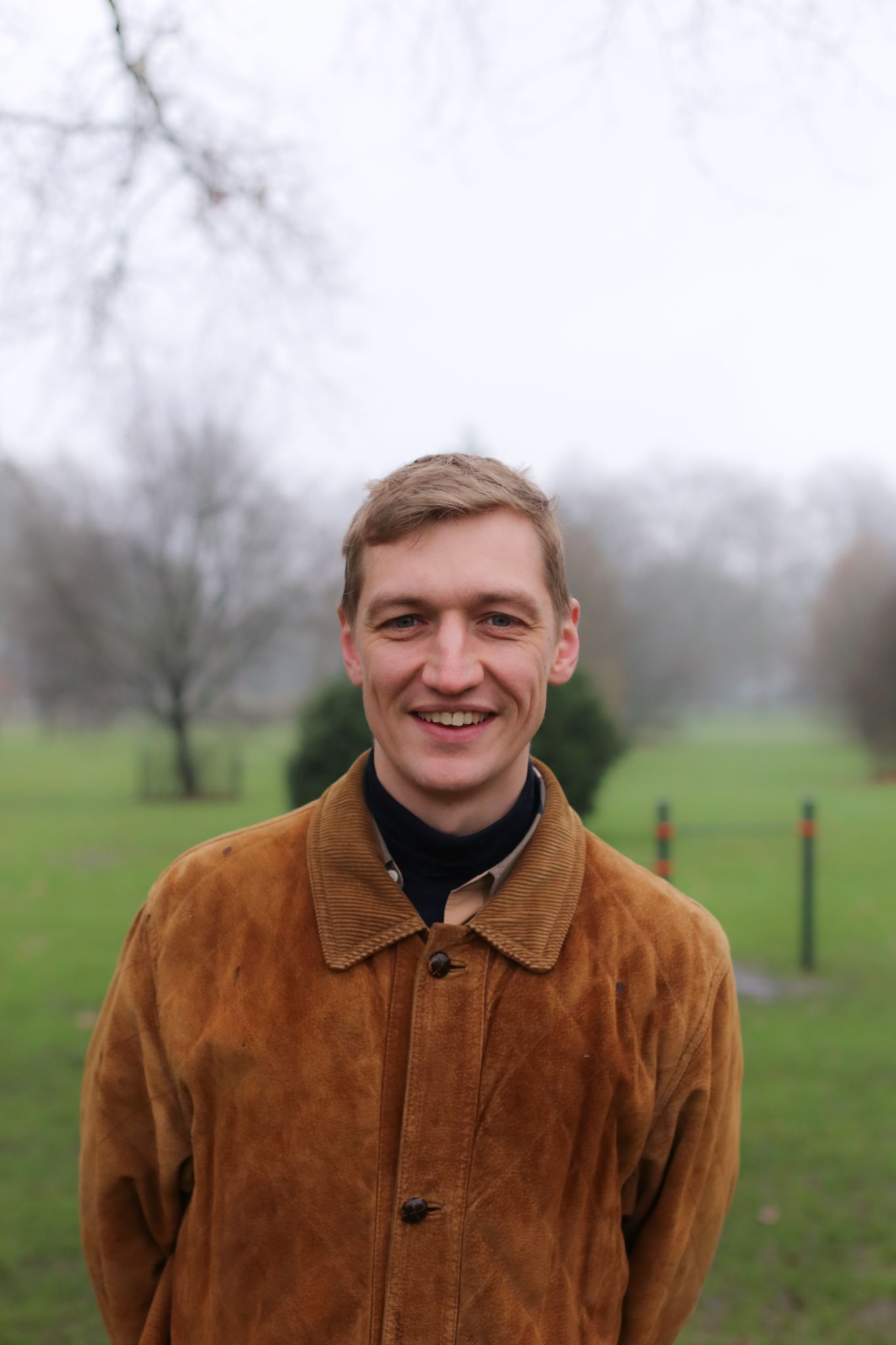The Scottish survival experience, beloved by Sir David Beckham, Ian Wright and heavyweight CEOs, that's all about learning to appreciate the dizzying brilliance of the natural world again
Patrick Galbraith follows in the footsteps of Sir David Beckham — who marked his 50th birthday with a 'survival' experience in the Scottish Highlands.
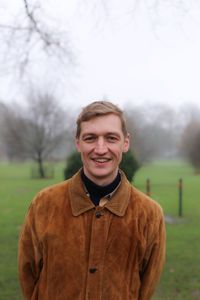
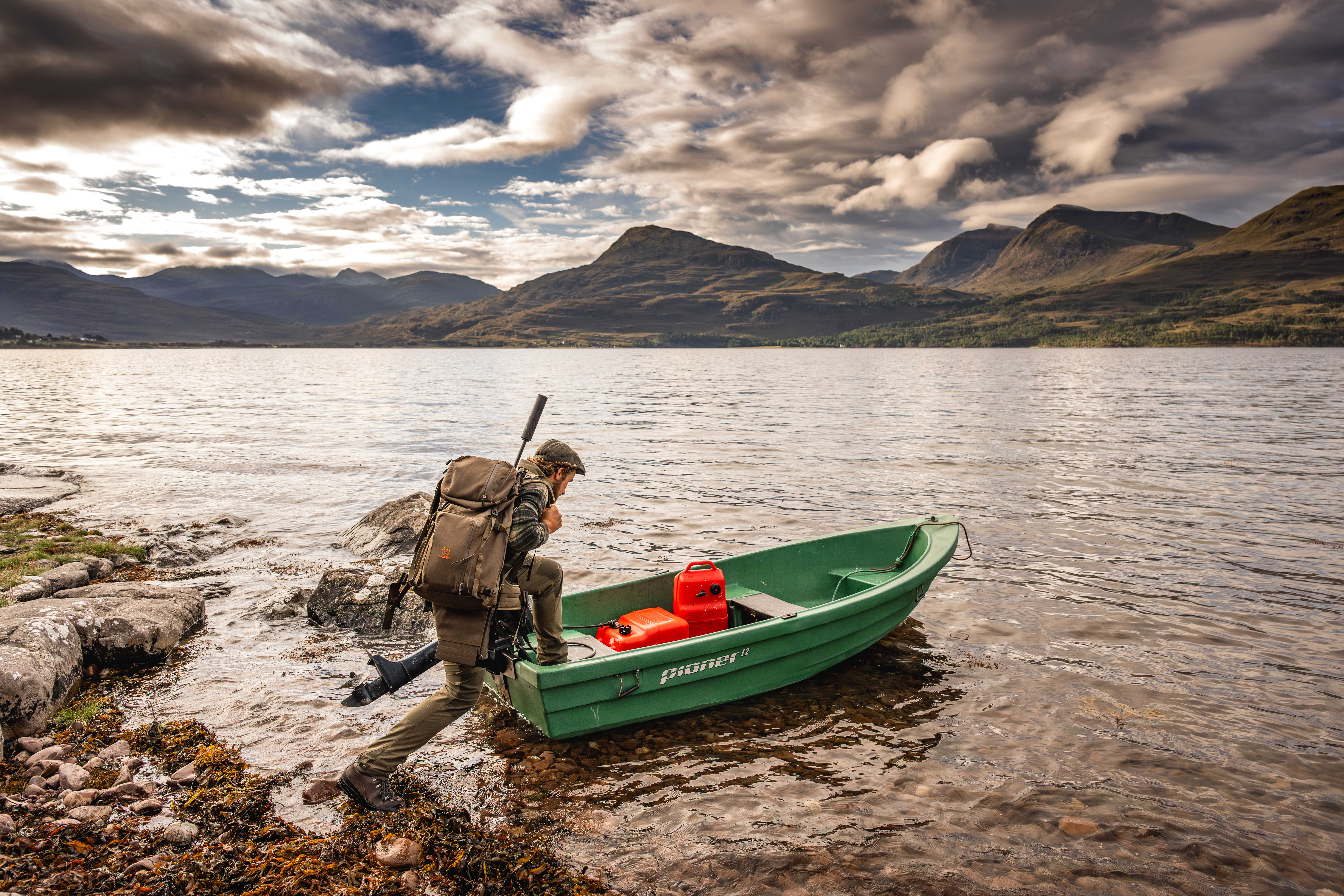
Standing in the Scottish midday sun in his kilt, Hamish Martin holds up a small white flower. ‘It’s incredible,’ he says in wonder. ‘It’s the flower called “eyebright” and if you really look at it, the detail is incredible.’ Hamish is often out in the hills with people who spend much of their time travelling across the world, and who see all sorts of great manmade wonders, ‘but the real universe,’ he goes on, ‘is in there’. He often asks guests to take a picture of the flower and then zoom in — each and every time, they are amazed by the colours and the immense complexity of a flower by which most of us would simply walk unheeding. When I look down at the myriad colours, the violet and yellow, Hamish explains that, for centuries, people in the Highlands used eyebright as ‘an eyewash’, for Highlanders who, as he does, get hay fever.
As he speaks about botany-cum-folklore in the sort of detail that it takes a lifetime to learn, Eliza Brown, who founded Rvival four years ago, saddles up the two Fell pack ponies that would carry our kit for the day. I didn’t realise it at the time, but that moment with Hamish, in a quiet way, was quintessentially ‘Rvival’. It is about recognising value in things most of us have long forgotten about. It was about learning to appreciate the dizzying brilliance of the natural world again.
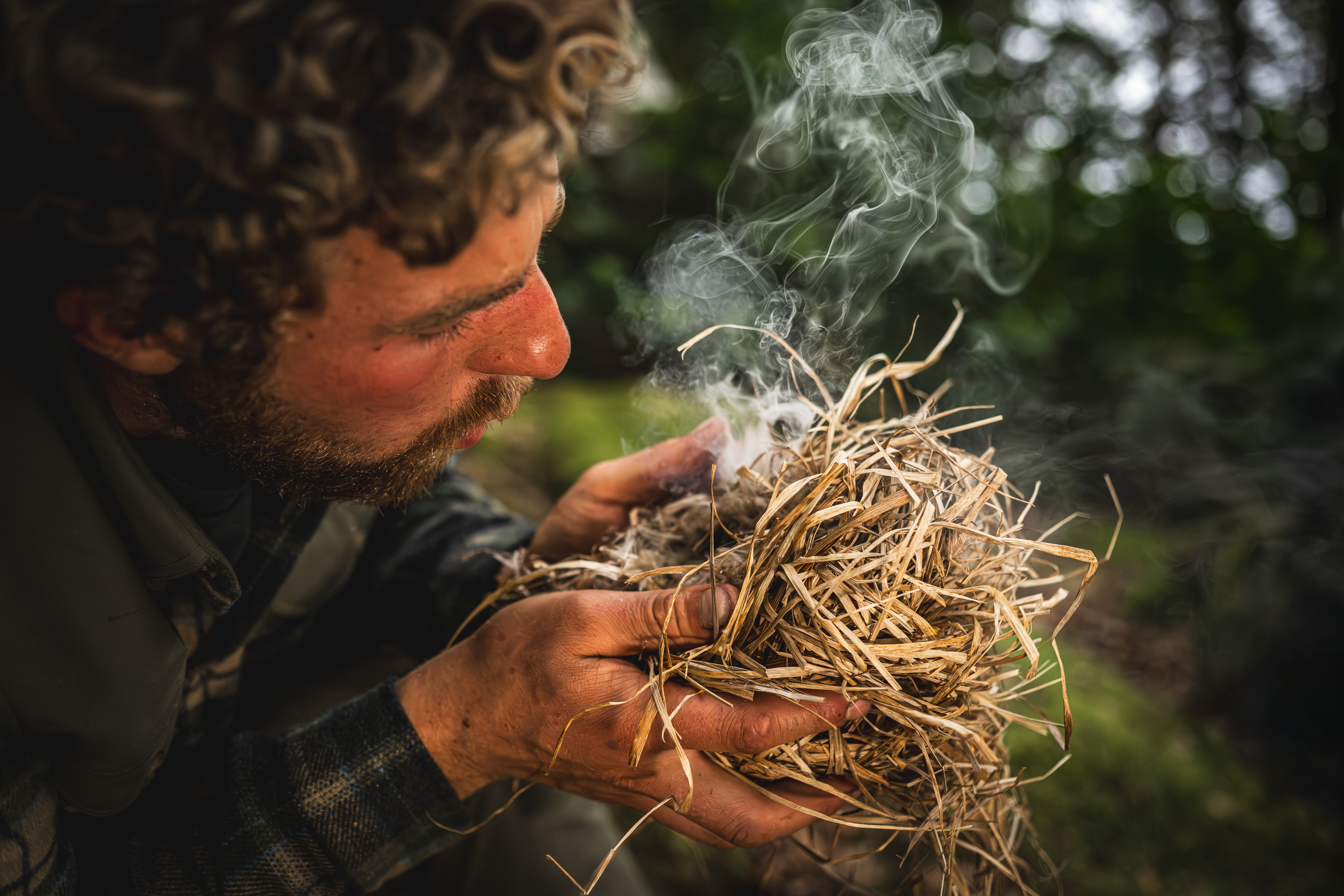
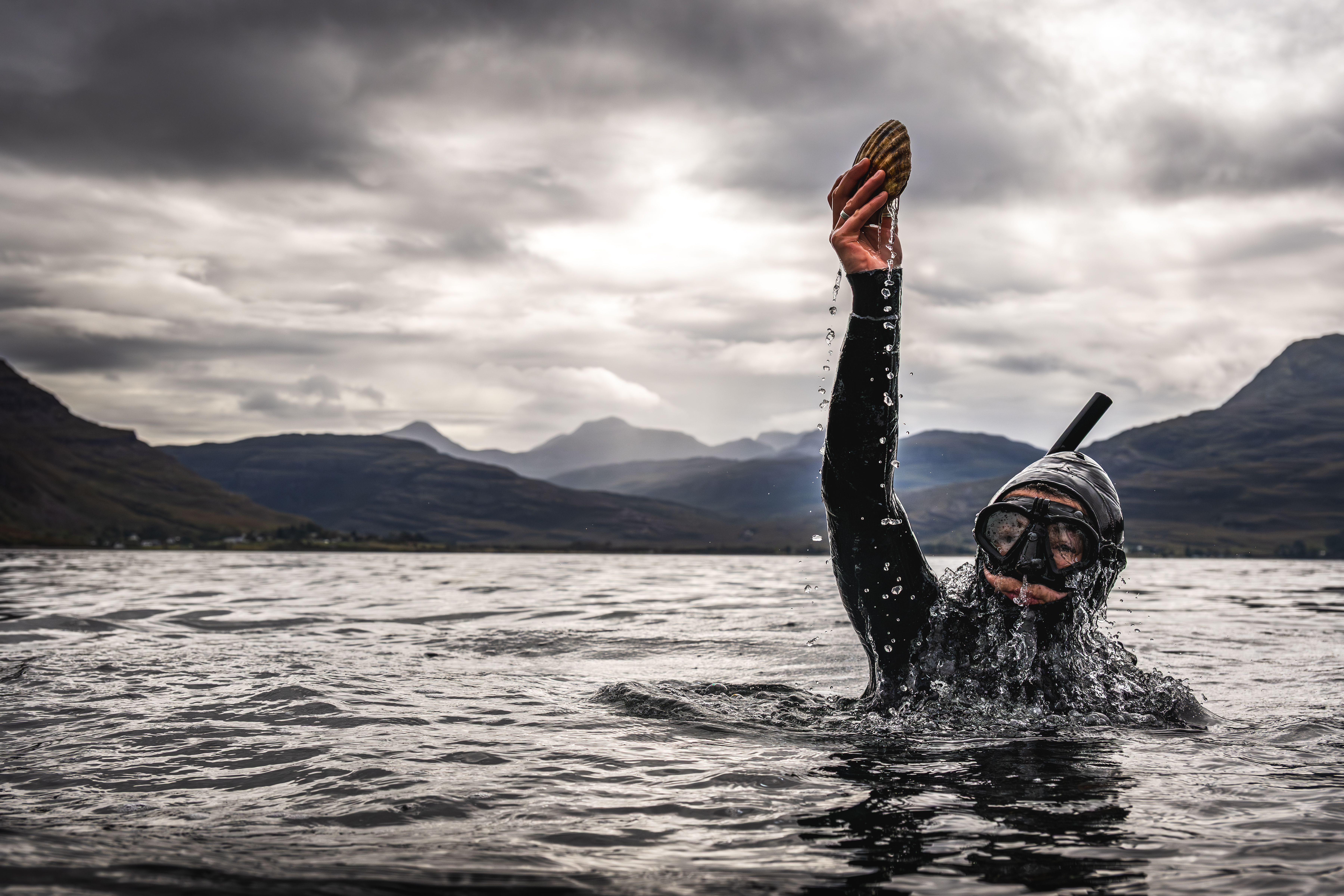
When Eliza started Rvival, she was at a low ebb. For some time, she had taken on challenges that were all about climbing higher, doing things faster and going further. They were, in her words, ‘extreme expeditions’ and, ultimately, she sustained an injury from carrying too much kit and had to rethink. When she was recovering, she set off across Scotland, heading from the south towards Cape Wrath at the northern tip with a pack pony, which forced her to travel at a different pace. Rather than rushing on to ‘tick off another box’, that next Munro or a new ocean, Eliza found herself taking time. She could go no quicker than the pony was willing to. Moving steadily through Nature, she found herself reflecting on her relationship with the world. As she journeyed, a memory of her grandfather making sticks when she was a child came into her head. It was the smell she recalled most vividly, ‘hazel and resin’. That memory inspired her to think about other skills we’re starting to lose, such as foraging and making fire. In losing them, she realised, we are losing part of ourselves and what it means to be human.
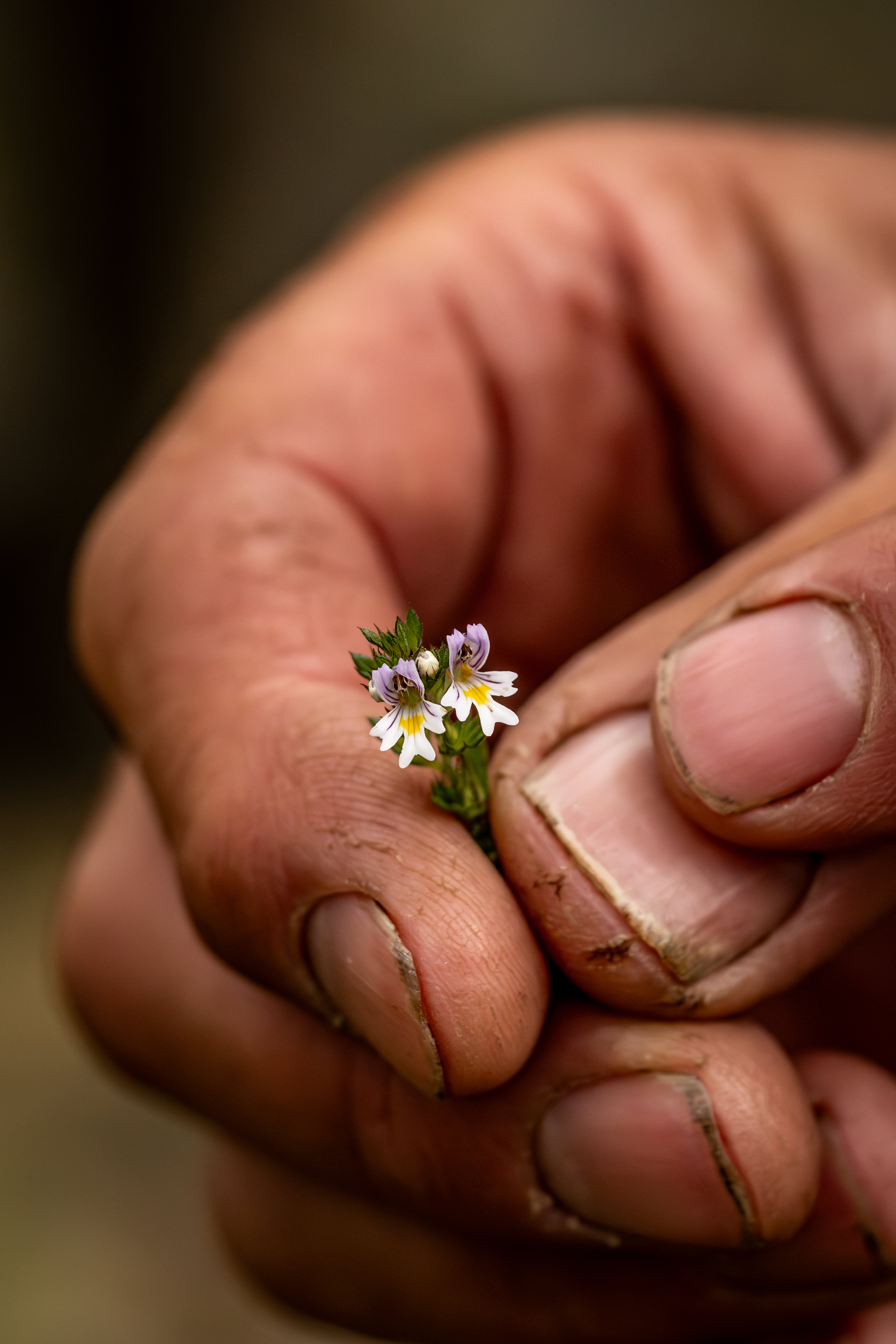
Rvival experts, including flame master Zeki Basan, can find the beauty and the use in the smallest things, from thistles to light a fire and rush grasses for smoking mackerel as well as eye-bright (above), which may relieve hay fever.
Eliza had been working on yachts and, back home after Cape Wrath, an idea started to come together. What if she took the sort of people who went yachting into the wild, ‘to offer them the opportunity to slow down and give them the skills to be in these places again’? It was only an idea, but she hoped that, if she got it right, she might impart greater respect for the land, something that her own packhorse journey had inspired in her.
When Eliza has saddled the ponies — which hail from Tom Lloyd’s Hades Hill herd—and Hamish has told me about the benefits of making tea out of the red clover beneath our feet, we head up into the hills. There is something timeless about wandering with Fell ponies. It’s a mode of travel that would have been entirely familiar to our ancestors 200 or 300 years ago, traipsing the packhorse trails that are now little more than memories in a landscape, but the idea of using Fells today is sadly little more than a curiosity for most. ‘They are special,’ Eliza says, wandering ahead of me, ‘it’s about maintaining a dying breed.’ For a bit, we walk in silence, except for the soft breathing of the ponies and a distant raven croaking in the late-summer heat.
By midday, we’ve passed Rob Roy’s Putting Stone, a boulder well known to climbers and lovers of Scottish history, and reached Lochan an Eireannaich, our lunch stop. It is a loch Hamish knows well, often showing guests how to fish it and, as he swims, Eliza explains that Rvival can be whatever clients want it to be. In a very short period, she’s assembled an extraordinary team of 19 people to create bespoke adventures. There’s Nigel Hawkins, who can take guests hawking, there’s the Basan family for a wild culinary experience — such as smoking freshly caught fish on the beach — and Gilly McArthur for ice swimming. Eliza’s team is varied, but all care about tranquillity, discovery and finding a deep connection with the wild.
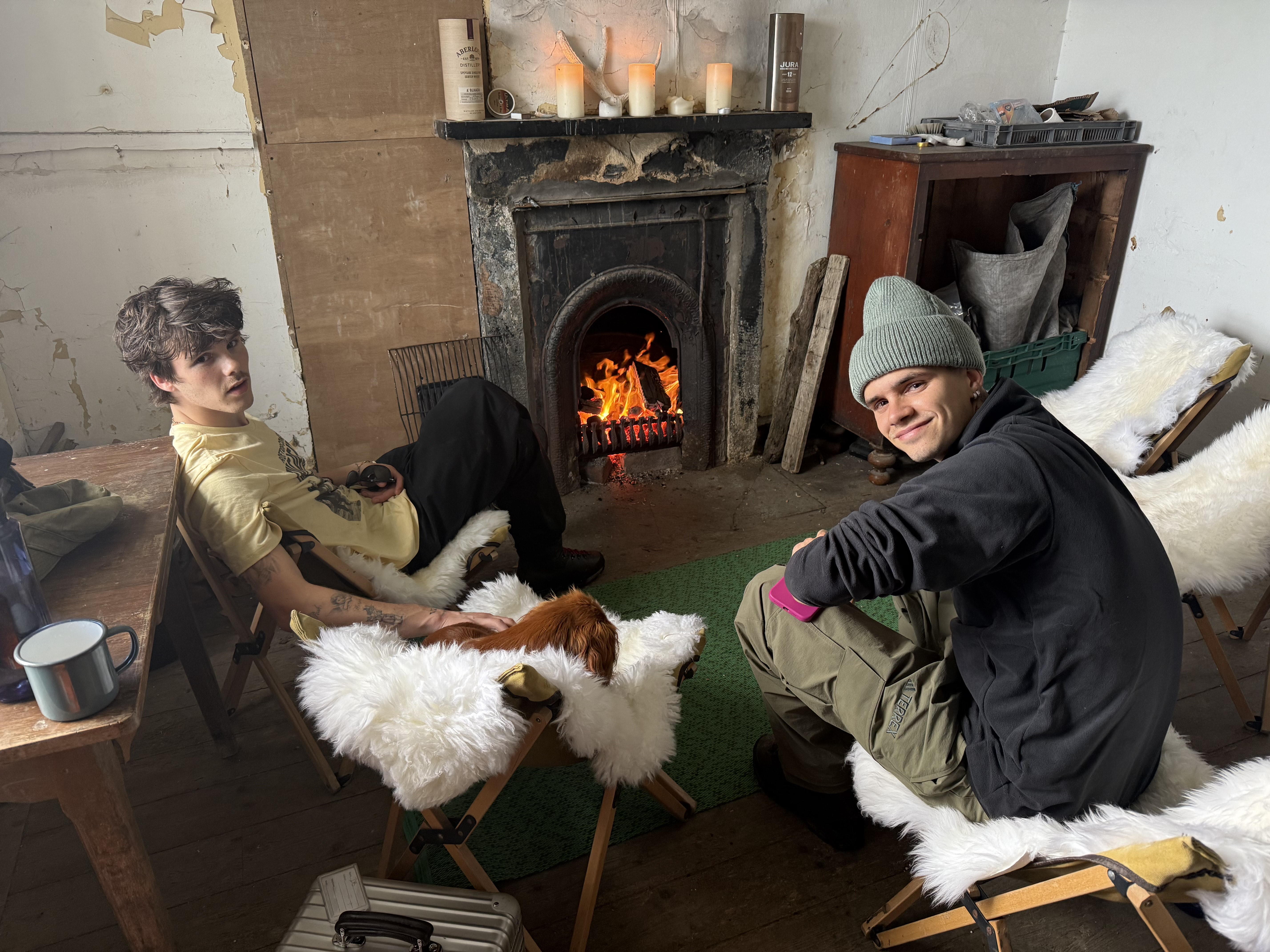
Fires are all the cosier when you collapse beside them after a long day in the wilds, as Cruz and Romeo Beckham discovered with Eliza Brown’s spaniel in a cosy bothy on Scarba.
Eliza soon began to get remarkable requests. She’s had famous actors, heavyweight CEOs, the footballer Ian Wright and our guest editor himself, Sir David Beckham, all joining her trips. The latter ended up in a bothy on the uninhabited island of Scarba with Rvival and Eliza fondly remembers finding him sharing a freshly landed scallop with her spaniel by the front door.
What Eliza realised is that her offering, the chance to ground yourself, is of great interest to those whose lives are lived at pace. It wasn’t her plan to attract people such as David, but people with demanding schedules, given a quiet moment, often find themselves thinking about tranquillity and ‘earthing’.
That evening, the ponies fed and watered, Tom Lewis, chef-proprietor of the Monachyle Mhor hotel in Highland Perthshire, skins a roe buck and lights a fire. Seeing somebody who really knows how to use a knife (in this instance, a knife made by the knife-maker Mic Taylor, a craftsman who is part of the team at Rvival) is really something.
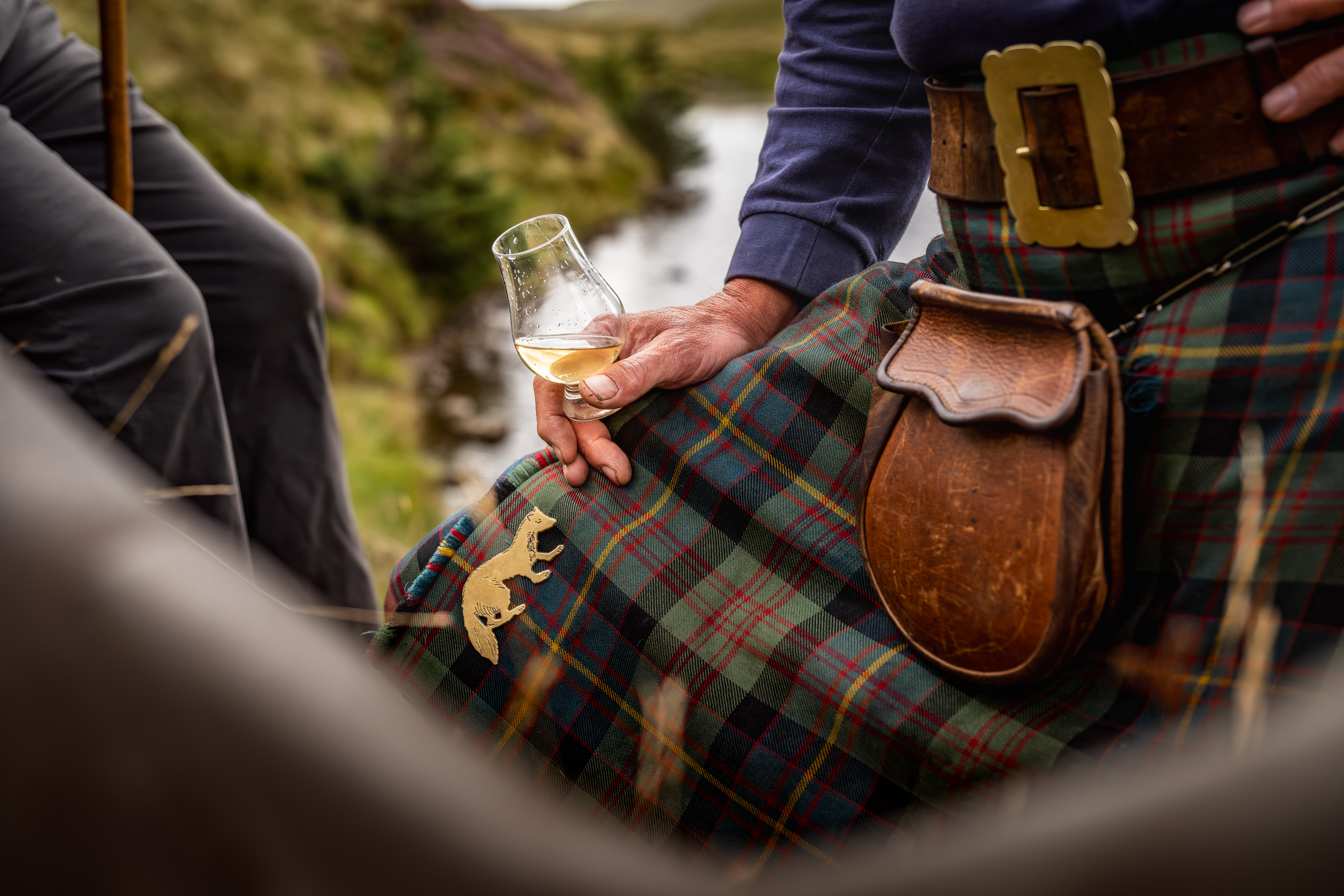
Eliza is keen to redefine luxury and part of that is offering very simple food, but food that is absolutely first class. Tom's pan-fried roe buck with foraged chanterelle mushrooms is exquisite. It’s charming to see such a seasoned pro getting behind the Rvival vision. It’s like the passing of a passion from one generation to the next.
The following morning, feeling exactly as I deserve to feel, given I’d stayed up late drinking whisky, I swim with Gilly. For all that I spend time outside, I hardly ever go for a dip and to reckon with the water as she does, as a source of revitalisation and wonder, is challenging and refreshing. Much of Rvival is about trying new things and, although I know my way around a deer carcass, I didn’t know that cold water can boost testosterone. I am now eagerly awaiting Gilly’s forthcoming book on cold-water swimming.
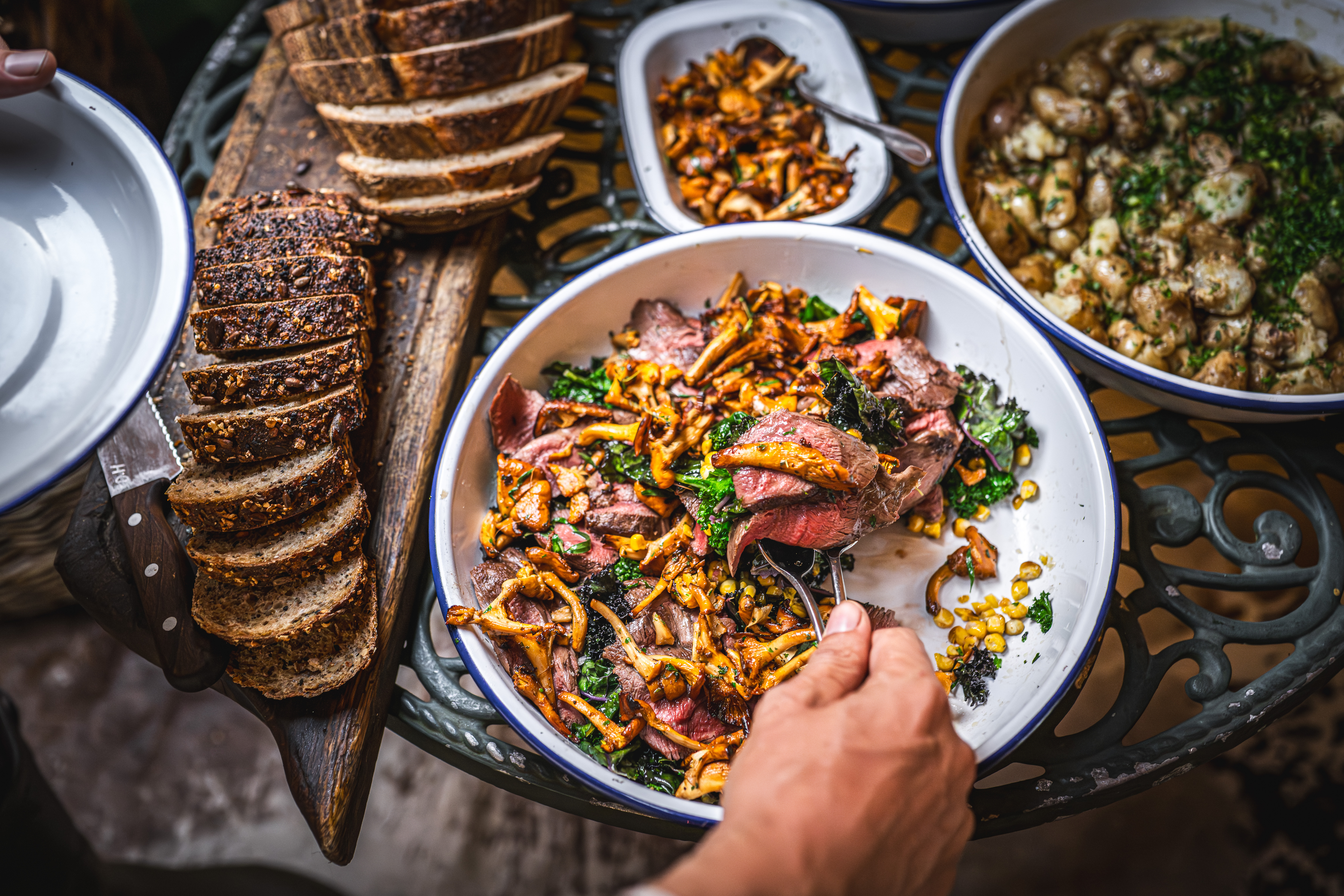
Dive for scallops, smoke freshly landed mackerel or whip up a divine feast in the open air, there’s something about embracing the outdoors that’s good for the soul.
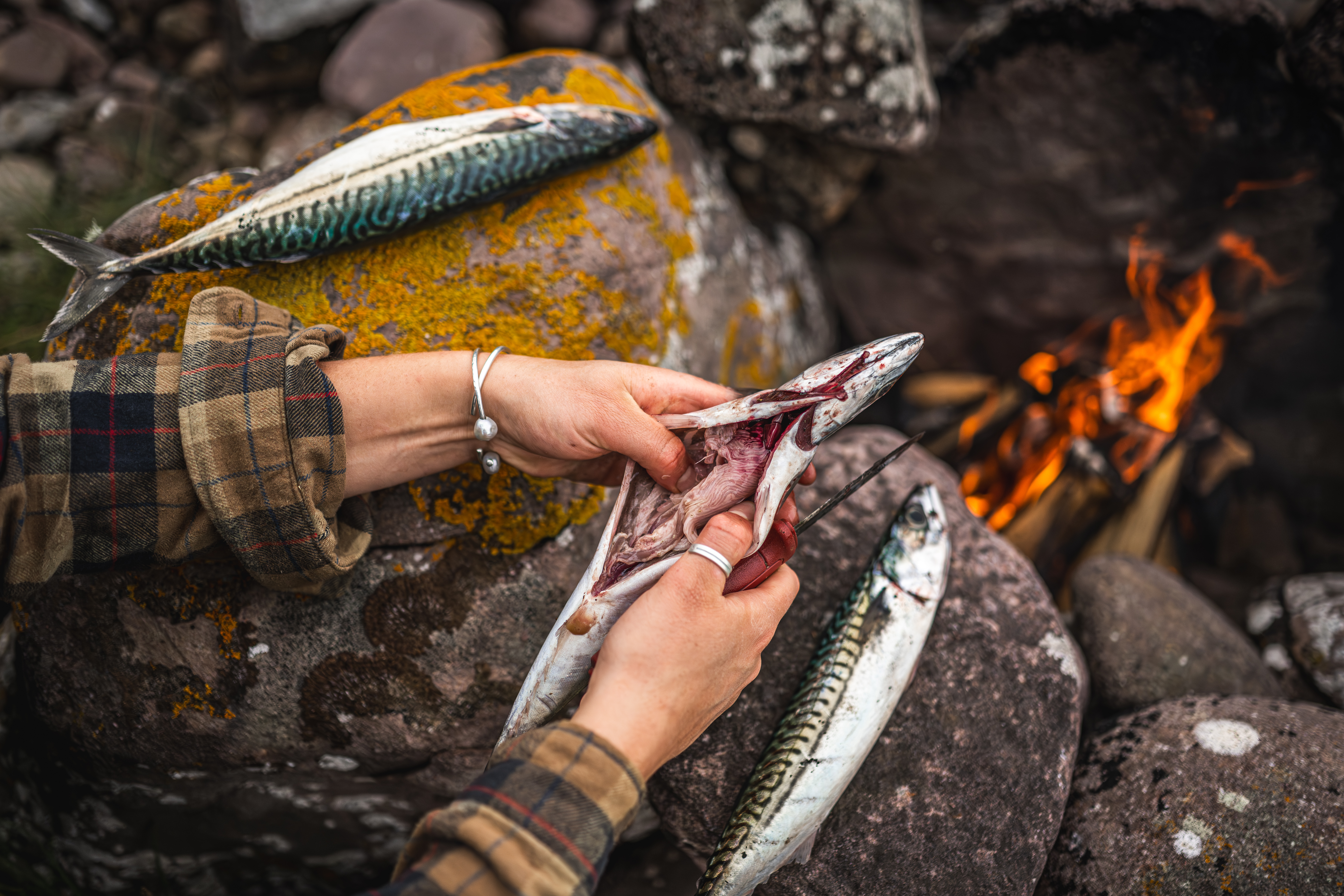
Rvival according to Sir David Beckham
'In the lead up to my 50th birthday last May — having planned some special events with my wife, Victoria, and our daughter, Harper — I wanted to take my three sons to the middle of nowhere in Scotland, on an excursion that would take us out of our comfort zones. Sadly, Brooklyn could not make it, but I had an amazing trip with Romeo and Cruz. We had the best time on a deserted island, fishing and eating the food we’d caught, before staying overnight in a bothy. I wasn’t expecting to have to do so much walking — we all felt it the next day — but we loved it.'
Our trip is an adventure of two halves. After Monachyle, we drive north to the Torridon estate, to find Zeki Basan gutting mackerel by a fire. As I stand with him, talking about rifles and deer and dogs, I realise this is the sort of thing we should all take time to do. In a world where people are disconnected from Nature, Zeki's passion is remarkable — David was reportedly amazed by it and it’s easy to see why, as there is something druidic about this man. His knowledge of plants and fungi connects him with a lost time.
Over the following few days, we snorkel for scallops, smoke mackerel on the beach over seaweed and, in the evenings, sit to listen to Sarah Von Racknitz, a native of Skye, playing the fiddle. It is both rustic and eccentric. Watching her, at one with the instrument, is to feel yourself becoming part of Highland culture.
On my final day, I have an experience that will stay with me forever. Among the birches and oaks, I sit with Zeki in a drizzle and he shows me how to make fire. It is a history of man. Some 50,000 years ago, ancient people would strike flint against pyrite, above tinder, until, finally, a spark took. As he demonstrates the art, against a tanned deer hide, it feels as if we have fallen back through time and are two Mesolithic men after a day of hunting. After using the pyrite, Zeki shows me how to use a bow drill, an intricate process that requires the right sort of wood (as a child, he failed many times). The specific thing I’ll remember is him showing me how amadou, a spongy layer of horse’s hoof mushroom, catches a spark and stays slowly smouldering without catching aflame. It allowed people to take fire with them on long expeditions. ‘Sometimes,’ he notes, as the rain falls harder, ‘families would carry fire from one generation to the next.’ It’s an extraordinary thought and, in a way, what Eliza and her team are doing at Rvival is carrying the fire.
Zeki’s demonstration offers the same thing that Hamish's thoughts on eyebright did and they chime, too, with Gilly's love of water — it is about slowing down and seeing the value in something that was once valued when we were more human.
Excursions with Rvival cost from £2,500 per person. Call 07377 386811 or visit their website for more information.
Patrick Galbraith is an author, journalist, former editor of Shooting Times, and a regular contributor to Country Life.
